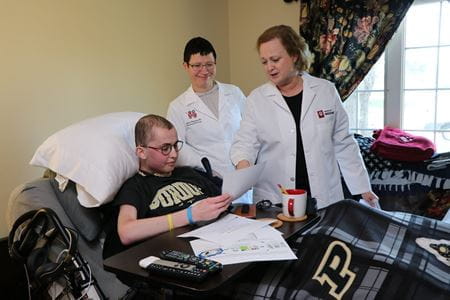Two new grants supporting osteosarcoma research have been funded at IU School of Medicine, building on work that has been previously established based on Tyler Trent’s tumor cells. Karen E. Pollok, PhD, is the lead researcher for both of these grants, including $1.9 million from the U.S. Department of Defense and $50,000 from the Sarcoma Foundation of America.
The grant from the Department of Defense is for the development of novel combination therapies to target DNA replication stress in osteosarcoma models. Osteosarcoma is an aggressive form of bone cancer, and the most common kind of bone cancer diagnosed in patients younger than 40 years old. Replication stress on DNA is commonly seen in patients who have been diagnosed with osteosarcoma, and while moderate replication can cause cancer cells to grow, high levels of replication stress can prevent cancer from progressing by killing the cancerous cells. As part of this grant, Pollok and her colleagues will examine combination therapies that can trigger high levels of replication stress to provide rationale to proceed with a clinical trial in the future, which would help them determine if the treatments can also be well-tolerated by patients. Their goal is to generate safety and efficacy data in order to create a clinical trial based on what they learn.
“This research project aligns with mission readiness as the military health focus area for the Department of Defense,” said Pollok, who is an associate professor of pediatrics at IU School of Medicine and a researcher with the Indiana University Melvin and Bren Simon Comprehensive Cancer Center. “When a service member or a family member of an active-duty service member is diagnosed with osteosarcoma, this can impact their mental health and welfare by causing stress, anxiety, depression, and in some cases substance use. Family is a great support system and if this strong network of support is shaken by negative circumstances such as diagnosis of a loved one with cancer, then the service member may be compromised in their readiness for a mission.”
The grant from the Sarcoma Foundation of America is supporting a separate study to develop optimized therapy for targeting specific kinds of osteosarcoma. This research focuses on therapies that can inhibit certain genetic variants in patients with osteosarcoma rather than using chemotherapy. The study team determined that cyclin-dependent kinases 4 and 6 (CDK4/CDK6) inhibitors can be effective in tumor models which are retinoblastoma-1 proficient (RB+), so they plan to compare the efficacy and safety of that therapy when combined with PI3K/mTOR inhibitors. Pollok said the long-term goal of this research is to develop a rationale for early intervention with targeted therapy for osteosarcoma patients, which could lead to a future clinical trial.
“Our team is so grateful to the many patients who have donated tumor samples for research,” said Pollok. “Our team has developed more than 40 models since the beginning of this program five years ago.”
Tyler Trent was a Purdue University student and sports superfan who died on January 1, 2019, after a long and valiant fight against osteosarcoma. He was passionate about cancer advocacy and donated his tumor tissue for research. In 2020, Pollok and her colleagues published their work about a combination therapy which significantly slowed tumor growth in models, which included a model established from cells taken from tumors donated by Trent.
Pollok’s research has also been supported by the Tyler Trent Foundation.
